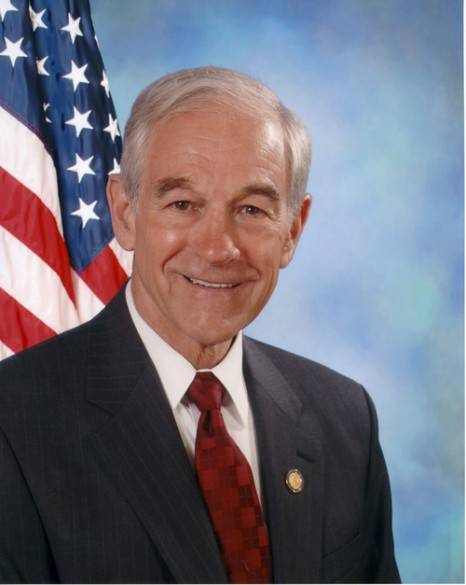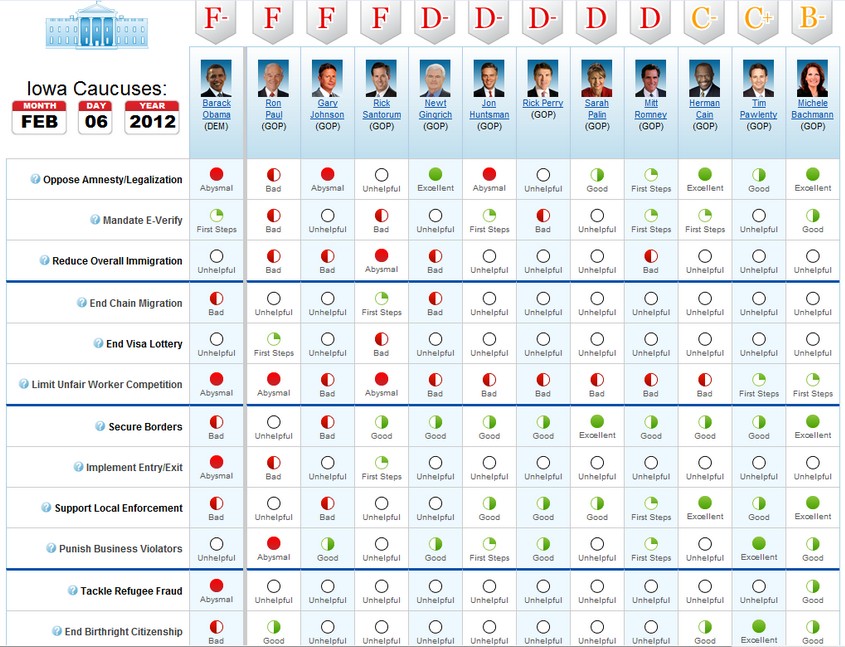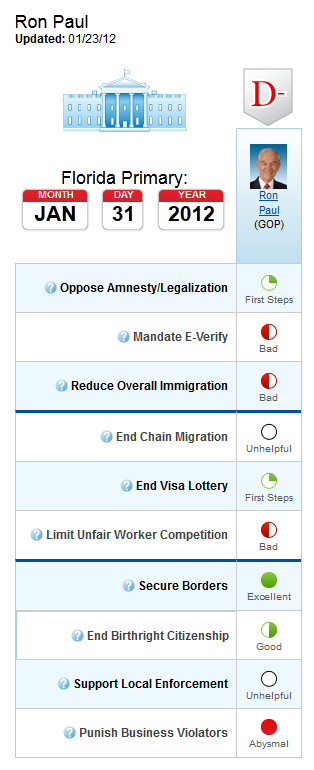
Introduction
I am personally a strong supporter of Ron Paul’s 2012 presidential bid. I have been a strong supporter of Congressman Paul since 2003 or 2004 when I first started getting politically involved. His commitment to sound economics, non-interventionist foreign policy, limited government, civil liberties, the Constitution, the pro-life position, states’ rights, and plain simple honesty is amazingly refreshing in time where as a rule politicians are corrupt, warmongering, big-government liars. Ron Paul’s main weakness, where I firmly disagree with him and many libertarians, is on the National Question: race, immigration, and nationalism. And unfortunately, Paul has been weakened even further in this area recently.
Ron Paul’s 2008 Campaign
NumbersUSA is an immigration policy group founded in 1997 which is dedicated to ending illegal immigration and reducing legal immigration into the United States. They put out scorecards on US Congressmen, US Senators, US Presidents, and candidates for those offices, rating their stances and voting record on immigration issues from A+ (the best) to F- (the worst). Categories rated include: reduce unnecessary worker visas, reduce anchor baby citizenship, reduce illegal immigration at borders, and reduce amnesty enticements, among others. NumbersUSA started doing these scorecards in 1997. Here are Congressman Paul’s ratings for the congressional sessions leading up to the 2008 presidential race: 1998 – D, 2000 – C-, 2002 – D, 2004 – C, 2006 – C+, 2008 C-.1 Once Paul actually entered the 2008 Republican presidential race, NumbersUSA gave the immigration stances in his platform an overall rating of C-. As bad as that may sound, that rating was actually the third best among the Republican candidates, behind only Duncan Hunter and Tom Tancredo.2 Of the three, Paul was by far the strongest in terms of support, money, and poll numbers. While Paul’s being in the top tier with a C- rating is more of an indictment of the Republican Party than an endorsement of Paul, it still made him the best viable candidate on the National Question. Further, Paul made securing the border one of his major issues alongside his views on economics and foreign policy, easing the concerns of many of his supporters (like me) about the issue. This was one of his official 2008 campaign commercials:
Unfortunately, Tom Tancredo dropped out of the race before the primaries began, Duncan Hunter had an absolutely abysmal showing, and, while he did manage to get as much as a quarter of the vote in several smaller states, Ron Paul won only 35 delegates, placing him a distant fourth behind open-borders NeoCons McCain, Huckabee, and Romney.3 Predictably, McCain’s limp-wristed campaign failed to beat Obama in the 2008 general election, giving Ron Paul another shot at the nomination in 2012.
Ron Paul’s 2012 Campaign
In the interim, Congressman Paul scored a C+ in 2010 and a C- in 2012 from NumbersUSA, giving his overall congressional career rating a B.4 NumbersUSA once again gave his presidential bid a C- rating in 2011. (The difference between the two is that what the candidate says he would do as president is factored into the latter.) This C- rating again placed him as the third best candidate on the immigration issue, this time behind Tim Pawlenty and Michele Bachmann. Then, in April of 2011, Ron Paul published his latest book Liberty Defined, in which he very unfortunately went soft on the immigration issue. The main reason behind this is Paul’s concern that any anti-immigration powers or legislation would be abused and give the federal government new power to erode the civil liberties of Americans.5 While this is a notably better reason for being bad on immigration than his NeoCon opponents’ “invade the world, invite the world” ideology, it still doesn’t excuse Paul’s backsliding on amnesty, advocating for more foreign workers, and seeking to remove responsibility from employers of illegals. NumbersUSA justly dropped Paul’s rating down from a C- to an F in the wake of the book release. This is the NumbersUSA scorecard of the Republican presidential candidate field after Paul’s book release:

Paul has since then qualified his positions enough to bring him up to a D-, but his positions are still far from ideal.6
 Because of his great positions on limited government, economics, and foreign policy, especially in comparison to the absolutely awful nature of the other candidates, Paul still has my support. However, it is important to recognize that Paul is very weak on the National Question and is not the ideal candidate because of this. Regardless, I would rather have an honest man in the White House with whom I have some disagreements rather than a pandering charlatan who said what I wanted to hear during the election with no intention of actually following through. Additionally, there are some mitigating factors which make Paul’s views on immigration much less negative than they appear on paper.
Because of his great positions on limited government, economics, and foreign policy, especially in comparison to the absolutely awful nature of the other candidates, Paul still has my support. However, it is important to recognize that Paul is very weak on the National Question and is not the ideal candidate because of this. Regardless, I would rather have an honest man in the White House with whom I have some disagreements rather than a pandering charlatan who said what I wanted to hear during the election with no intention of actually following through. Additionally, there are some mitigating factors which make Paul’s views on immigration much less negative than they appear on paper.
Mitigating Factors
First of all, Americans have become used to the near dictatorial powers that US presidents have acquired over the last century, and especially in the last several decades. In this situation, where the executive branch is almost a law unto itself and has massively increased power and jurisdiction well above and beyond the bounds of the Constitution, and where the president can easily bypass the legislative process with an executive order, the President’s views on a subject are extremely important, as they will directly affect US policy. But Ron Paul is a strict Constitutionalist; he opposes all of these usurpation of power from the states and from the legislative branch. Thus, while Obama has no problem issuing back door amnesties via executive branch fiat, Ron Paul would not take such moves, as he rightly considers them unconstitutional regardless of his personal views on the issue involved. Further, Ron Paul is a staunch advocate for and believer in the 10th amendment and states’ rights. While Paul states in his book Liberty Defined that he thinks Arizona-style immigration laws are a bad idea, he’s not going to use the power of the federal government to sue the states to try to block the laws or bash them in reports to the United Nations Human Rights Commission. The Constitution was intended to make the personal views of the president less important than the actual laws and to allow the states a pretty free hand in managing their own concerns. A Paul presidency would return us to that state of affairs.
Secondly, I have a rule that I never believe anything a candidates says while campaigning for office unless it is backed up by his actions and voting record. Words are wind and promises mean nothing in today’s political environment; only actions matter or count. I mentioned earlier that as a Congressman, Paul has a B rating on immigration. So when the rubber hits the road, he’s actually not too bad on immigration, on which I put more weight than a campaign message tailored by Paul’s campaign staff to appeal to independents and left-libertarians. Additionally, there are those Ron Paul newsletters in the ’70s and ’80s, which (despite anyone’s claims) Ron Paul most certainly knew about and signed off on. Anyone who is willing to print such brutally honest and truthful assessments of race has to the know the real score even if he’s not willing to publicly admit to it. And even though he’s calling MLK Jr. his hero now, when it came to it, Paul voted against MLK Jr. Day — twice. These factors tend to make me think that Paul will be better on the National Question than his current D- rating would imply.
Thirdly, Paul has taken a lot of well-deserved flak from white racial realists over his brown-nosing of Martin Luther King, Jr., Rosa Parks, and minorities in general during debates, including this quote from one of the New Hampshire debates:7
One of my heroes is Martin Luther King because he practiced the Libertarian principle of peaceful resistance and peaceful civil disobedience, as did Rosa Parks. But also I’m the only one up here and the only one in the [Republican] party that understands true racism in this country that’s in the judicial system, and it has to do with enforcing the drug laws.
Of course, Paul ignores the fact that if a group disproportionately participates in crime, then it is going to be disproportionately jailed. Either Paul is so blinded by his libertarian individualist ideology that he simply can’t deal with group behavior and differences, or he views his policies as so important that he is willing to distance himself from his newsletters, as an open “racist” would find it much harder to get elected. If the former, then he’s just plain wrong; for example, white criminals are more likely to get the death penalty than black ones are. If the latter, then I don’t think it’s a particularly smart strategy. White Republican voters (is there another kind?) are looking, at least implicitly, for a standard bearer on the National Question. Gingrich won South Carolina simply by standing up to a black moderator — imagine how much support Paul could get from strong positions against immigration and for border security. Regardless, the point remains that Paul is doing his best to become president of the MLK Jr. fan club as well as of the United States. However, the really important point to all this is that Ron Paul is a true believer (or at least presenting himself as one). We at Faith and Heritage all know that the Marxist Civil Rights Movement wasn’t about equality (as bad as that would be) for the blacks; it was about elevating themselves about whites — making them a preferred class with the power to loot the system at will and reap the rewards of preferential treatment. But to make their goals palatable to the general population, they had to couch their views in equality rhetoric, rhetoric that Ron Paul is now using. Thus, the conclusions at which Paul arrives at the end of all this brown-nosing is not the elevation of blacks above whites as MLK Jr. intended, but to actually follow through on this equality rhetoric and make everyone equal before the law. This would destroy the spoils system the Civil Rights Movement setup for blacks. MLK Jr. was a great man and absolutely right: therefore we should end affirmative action, race-based quotas, welfare handouts, and all the rest of the preferential treatment of blacks and minorities; we’re individuals and equal after all, right? Content of character and not color of skin, right? In essence, this is exactly the opposite of what has been happening to conservatives for decades. You get a “conservative” Republican who talks the conservative talk, then gets elected, goes to D.C., and once there votes in ways which directly undermine the values on which he ran. Now we have a conservative who is running on MLK Jr.’s words in order to destroy MLK Jr.’s legacy.
And finally, even though Ron Paul is doing much, much better this time around than in 2008, his candidacy is still a longshot. He will most likely come in second or third in delegates, and then lose out when the NeoCons pool their delegates against him in order to nominate one of their own. This is the unfortunate reality. Paul is currently 77 years old:this is his last hurrah. However, over the past four years, Paul has built an impressive base of supporters along with his powerful Campaign for Liberty organization and national recognition for the Paul name. All of this will almost certainly be passed on to his son Rand Paul, a junior US Senator from Kentucky, when Ron Paul retires. If Ron Paul doesn’t receive the Republican nomination, then the Republicans will most likely lose the general election to Obama again. This sets Rand Paul up for a presidential run in 2016, which is excellent news for us. Rand Paul shares his father’s great views on limited government, economics, and foreign policy, while at the same time being much better on the National Question. Rand Paul currently holds a B- rating on NumbersUSA, which I expect to improve as he has a chance to vote on more legislation.8 In short, Rand Paul is much closer to the ideal candidate than his father is, and the more support we give his father now, the better position Rand will be in when 2016 rolls around.
Conclusion
I have never bought into the “lesser of two evils” political philosophy. However, I also believe that rejecting good candidates because they are not perfect is an equally destructive strategy. We could all wish that Ron Paul was stronger on the National Question, but Ron Paul is a good candidate and, even rarer, an honest man who has for years been a lone voice of reason and advocate of fidelity to the Constitution. There are no better candidates running ,and he continues to have my support.
Footnotes
- http://www.numbersusa.com/content/my/congress/787/reportcard/CAREER/#tabset-3 ↩
- http://web.archive.org/web/20080117014811/http://www.betterimmigration.com/candidates/2006/prez2008.html ↩
- http://en.wikipedia.org/wiki/Republican_Party_%28United_States%29_presidential_candidates,_2008 ↩
- http://www.numbersusa.com/content/my/congress/787/overview ↩
- http://www.numbersusa.com/content/action/ron-paul.html ↩
- http://www.numbersusa.com/content/action/ron-paul.html ↩
- http://motherjones.com/mojo/2012/01/ron-paul-newsletter-debate-racist-martin-luther-king ↩
- http://www.numbersusa.com/content/my/congress/9922/reportcard/RECENT/#tabset-3 ↩
| Tweet |
|
|
|




